Bunnygo21 - Untitled
More Posts from Bunnygo21 and Others
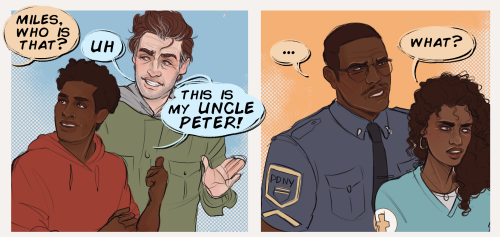
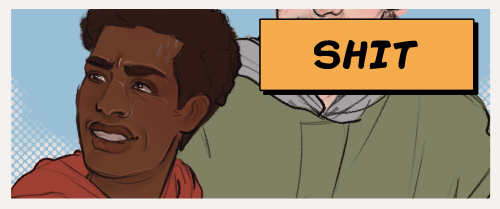
miles “who’s morales” morales’s biggest weakness is the cover story
for the fic title game, 'you're the ghost of your predecessors'?
OKAY so I know a lot of people will be thinking like Tim or Damian for this one, and I get it. I get it. But Steph. Fic with Steph focusing on her sense of identity and how it's always been tied so closely to other people. First, her father, as Spoiler. Next, as Robin, everyone that came before her—Dick, Jason, Tim. Wanting so desperately to be her own Robin—good like they were, but in her own way, but at every turn she was condescended to, compared, disrespected, and just couldn't be her own Robin.
Then there was Batgirl, and Batgirl was a breath of fresh air. Batgirl wasn't under Bruce’s jurisdiction any more than Oracle was—Batgirl wasn't Robin. But, but, but. As Batgirl, she had to be as smart as Babs, as strong as Cass, and as kind as the both of them. As Batgirl, the load to be as good as her predecessors was one she put on herself, to prove their trust in her wasn't misplaced or misguided. Another mantle, more legacies to uphold.
Then, fast forward a bit, and she's Spoiler again. And Spoiler was created to spoil her father's plots and get him in jail, but, well, he's been in jail for around three years now, and with the strings she's sure were tugged, he's not getting out any time soon. And, she- Spoiler is hers. Nobody's but hers. And she doesn't know how to feel about having a title that's just hers.
She's still got the weight of Robin and Batgirl on her shoulders, but maybe this is one she doesn't mind bearing. She's a ghost of her predecessors, but it doesn't sound so negative now. Maybe she can live with that.
She's a reflection of everyone that's come before her, and that isn't too bad. Dick's determination, Jason’s compassion, Tim's crazy-smart kindness, Cass' strength, Babs' intelligence. Bruce’s paranoia.
Damian has your bravery, Tim tells her once, and she almost breaks down sobbing. She can be a ghost of her predecessors, if that means those that come after her will be a ghost of her too.
i’ll say it til the cows come home but as undeniably strange as the star wars prequels are, george lucas’ direction with anakin was downright fucking inspired. people were waiting for whatever badass backstory lucas was sure to give them, awaiting a naturally intimidating actor with rogueish charm to be cast, waiting for this masterpiece of badass villainy or whatever, and george lucas is like no, no, i’ve got you. and then he finds the one man on the planet who looked babier than baby mark hamill and says, “his main personality trait will be being weird and awkward, secondary personality trait loving his wife, tertiary personality trait being incredibly good at murder, and all of these traits will do battle on the silver screen for three movies until they all win in possibly the worst way.” that fucking rules. george lucas could’ve done anything with darth vader and he willingly, enthusiastically chose mentally unstable college student who is somehow married but his only friend is his kind-of dad. that fucking rules, top down, that’s fucking exquisite. if you don’t think that premise is inherently entertaining you’ve got no taste
Penguin falls down resulting in best sound ever [x]
Comics Masterpost (organised by collection)
Please heed relevant content warnings on each post. Completed collections have physical and digital copies available for purchase on my store.
Soliloquy Down to Three [COMPLETED]

Soliloquy down to Three is an anthology of dark sapphic comics, all of which are a mix of both old and new inspiration. Its title is a line from 'craters', indicating that the phrase "I love you" manages to fit a whole monologue worth of feeling into three words.
The compiled version contains exclusive illustrations for each couple, as well as a secret ending to 'craters'.
1. fishing twine 2. hook, line and sinker (sequel to 'fishing twine) cw: suggestive imagery 3. RED cw: suggestive imagery, blood, murder with an axe 4. RED - epilogue cw: blood 5. patchwork canary cw: mouth + neck mutilation, blood 6. craters cw: implications of suicide
♢♢♢♢♢♢♢♢♢♢♢♢♢♢
10PM [COMPLETED]

10pm is a collection of introspective comics that covers feelings of aimlessness, alienation and finding joy in creativity again. Its full title is "It's 10pm. Do you know who you are?" which is a twist on the old PSAs that used to play on American TVs reminding parents to check up on their children.
1. the parade
2. the elevator
3. the machine
4. the candle
5. the stone
6. the dredger
♢♢♢♢♢♢♢♢♢♢♢♢♢♢
Hearteaters [COMPLETED]

Heart-eaters is an anthology about the ugliest, gory-est, most heartfelt and most brutal parts of love. Sitting at a whopping 180 pages, Heart-eaters is the longest anthology I've made yet, and took over a year to finish in full.
The compiled books available for purchase on my store contain an exclusive joint-comic to "Shallow Grave" and poem named "Laozi's bowl", as well as 9 original full-page art splashes unique to their assigned stories.
1. the sunset cw: gun violence, death, blood 2. the calamity cw: eye scarring, blood, eye mutilation, gore (minimal) 3. seeing clearer (epilogue to 'the calamity') cw: biblical references 4. shallow grave cw: gravestone imagery 5. bite of winter (joint comic to 'scorched earth') cw: gore, blood, death, cannibalism, dismemberment 6. scorched earth (joint comic to 'bite of winter') cw: blood, death, burning alive, beheading 7. ashes to ashes (prequel comic to 'scorched earth') 8. little dove (prequel comic to 'scorched earth') 9. warmth 10. the fox god cw: emotional manipulation, animal abuse 11. the fields cw: blood, animal death, mild gore and blood
I never realized this but Padme literally has a harem of women who are as awesome as her.
padme's handmaidens are such an underrated concept. i mean, yeah you can call it women supporting women and leave it at that but like. its so much more intense than that. they basically created the persona of queen amidala together. they assigned her specific mannerisms and tone of voice and breathing patterns and all of them studied that well enough to play the role perfectly. they put all of the derangedness teenage girls put into discovering their own identity into perfecting mimicry instead & they did all that knowing that their role will always be to die in padme's place if it comes to that. idk what insane levels of devotion does it take to be like 14 and you've become so intimately familiar with your friend that you can quite literally become her. there's friendship & traumabonding and then theres "my entire life is dedicated to dying for this woman" and then there's that but with added identity fuckery and thats what the handmaidens have going on with the bonus point of being 14
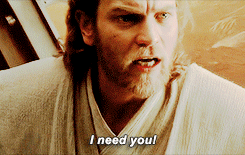
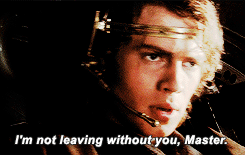

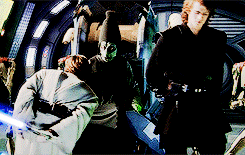

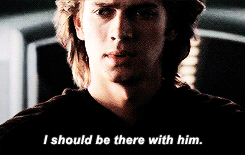


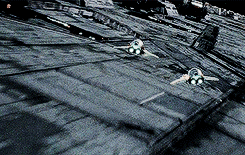
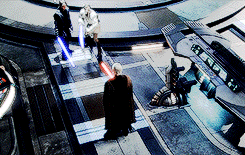
“Obi-Wan picked up Anakin’s lightsaber. He lifted his own as well, weighting them in his hands. Anakin had based his design upon Obi-Wan’s. So similar they were. “
Alternate ending of The Horse And The Infant;
Eurylochus: Captain. What is that
Odysseus, holding baby Astyanax, smiling: A gift from the gods! A boy for us to take back to Ithaca and for me to raise as my own. A token of our victory, if you will.
Polites: Not to doubt you, my friend and king, but is that not the baby the gods said you must kill?
Odysseus, with a slightly more strained smile: I am unsure what you mean, my friend. This is but a harmless babe.
Eurylochus: No, Captain, I remember Lord Zeus clearly saying he'll be the death of us all-
Odysseus, louder: I remember no such thing. Come, we must sail! Ithaca, my wife, my son, need us home.
Polites, to Eurylochus: Does he take us for blind?
Eurylochus: He takes us for loyal. Which we are, unfortunately.
my favorite piece of modern art is Ai Weiwei’s Sunflower Seeds, over one hundred million hand-painted ceramic sunflower seeds made by dozens of craftsmen



In a lecture series on Youtube, #1 New York Times best-selling author Brandon Sanderson talks about the three P's of plot structure: Promise. Progress. Payoff.
Promises are particularly important in the beginning of the story, as they draw in the audience.
Progress keeps the audience invested, particularly through the middle of the story. If there is no sense of progress, then the reader feels as if the plot isn't going anywhere.
Payoff is what fulfills the promises of progress. It rewards the audience for sticking around, and if done properly, creates a feeling of satisfaction at the end of the story.
While all three can be tricky in their own right, many writers struggle to create a proper sense of progress, which can lead to saggy middles.
Luckily, Dramatica Theory breaks plot down into eight story points that essentially encapsulate progress.
If you apply them to your stories, your writing will always have progression through the middle.
1. Goal - Every story has a goal. It may be a goal of aspiration, such as becoming a top chef. Or it may be a goal of thwarting something, such as stopping a murderer. Whatever the case, a story's goal is what enables us to measure progress. If there is no goal, then what one does, doesn't really matter. We have no orientation or purpose, so there is no sense of moving forward or backward. The goal allows progress to happen.
2. Requirements - In order to achieve the goal, something is required. This can be broken down into two variations. In one, the characters must follow an order of steps, like following a set of directions. In the other, the characters must do or obtain things in any order, like a shopping list. The characters in Jumanji, for example, have the goal to restore the world to normal. The requirement is to win the game. But they must do this in a proper order--they can't skip turns.
3. Consequences - Consequences are what happen if a goal isn't achieved or hasn't yet been achieved. In some stories, the protagonist is trying to prevent the consequences, but in others, the protagonist is trying to stop the consequences that are already happening. Consequences might be thought of as overall stakes. In Ralph Breaks the Internet, if Ralph and Vanellope don't buy a new steering wheel for Sugar Rush, then its characters will be homeless.
4. Forewarnings - Forewarnings convey that the consequences are getting closer, becoming worse, or becoming permanent (depending on the story). If a dam is in danger of breaking, then a forwarning may be a crack that shoots out water. In Back to the Future, Marty's family slowly disappearing from a photograph works as a forewarning.
5. Dividends - Characters will likely receive small rewards for little successes along the journey to the goal. These are dividends. For example, on her journey to fight in the war in her father's place, Mulan is rewarded honor and a place in the military when she is able to retrieve an arrow from a wooden post that none of the men could get down.
6. Costs - Just as the journey may include dividends, it also entails costs. These have negative impacts on the protagonist's well-being. In order to win The Hunger Games, for example, one must be willing to kill others, which also includes psychological trauma. In order for Frodo to get to Mount Doom to destroy the Ring, he must suffer a loss of innocence. This is a cost.
7. Prerequisites - There are often certain essentials one must have, to pursue the goal at all. These are prerequisites. Prerequisites on their own don't bring the goal closer. This is why they aren't requirements. In Interstellar, a spaceship, equipment, and astronauts are needed to travel space to find a new home (goal). But simply having those things doesn't necessarily mean the characters are closer to discovering a liveable planet.
8. Preconditions - Preconditions do not directly relate to the goal. They are "non-essential constraints or costs placed on the characters in exchange for the help of someone who controls essential prerequisites." In Karate Kid, a prerequisite is that the protagonist must receive extra lessons from a master, but the master adds the precondition of doing chores. One does not technically need to do chores to do karate.
Some of these points are more direct--like requirements--while others are more indirect--like preconditions. The direct points will usually be more intense than the indirect. As you apply these elements to your stories, you'll create a sense of progress--especially through the middle, which will help make any story more satisfying.
-
 wizardpest reblogged this · 1 month ago
wizardpest reblogged this · 1 month ago -
 thisistrashking reblogged this · 1 month ago
thisistrashking reblogged this · 1 month ago -
 milomaybe liked this · 1 month ago
milomaybe liked this · 1 month ago -
 thesoftestpunk reblogged this · 1 month ago
thesoftestpunk reblogged this · 1 month ago -
 samuelwire liked this · 1 month ago
samuelwire liked this · 1 month ago -
 mystery347 liked this · 1 month ago
mystery347 liked this · 1 month ago -
 crystalbud98 liked this · 1 month ago
crystalbud98 liked this · 1 month ago -
 15depressedducks reblogged this · 1 month ago
15depressedducks reblogged this · 1 month ago -
 15depressedducks liked this · 1 month ago
15depressedducks liked this · 1 month ago -
 wizard-alchemie reblogged this · 1 month ago
wizard-alchemie reblogged this · 1 month ago -
 da-extroverted-introvert reblogged this · 1 month ago
da-extroverted-introvert reblogged this · 1 month ago -
 da-extroverted-introvert liked this · 1 month ago
da-extroverted-introvert liked this · 1 month ago -
 the-dark-cloud reblogged this · 1 month ago
the-dark-cloud reblogged this · 1 month ago -
 bellaquerida reblogged this · 1 month ago
bellaquerida reblogged this · 1 month ago -
 alec1786 liked this · 1 month ago
alec1786 liked this · 1 month ago -
 onelastsailxr liked this · 1 month ago
onelastsailxr liked this · 1 month ago -
 astrahannah liked this · 1 month ago
astrahannah liked this · 1 month ago -
 metagamingseagull liked this · 1 month ago
metagamingseagull liked this · 1 month ago -
 mantisu reblogged this · 1 month ago
mantisu reblogged this · 1 month ago -
 redheadedwarrior reblogged this · 1 month ago
redheadedwarrior reblogged this · 1 month ago -
 kiir-bee reblogged this · 1 month ago
kiir-bee reblogged this · 1 month ago -
 sweetcheekschronicles reblogged this · 1 month ago
sweetcheekschronicles reblogged this · 1 month ago -
 aruberto liked this · 1 month ago
aruberto liked this · 1 month ago -
 stupidity496 liked this · 1 month ago
stupidity496 liked this · 1 month ago -
 silversong79 reblogged this · 1 month ago
silversong79 reblogged this · 1 month ago -
 moss-on-a-rock reblogged this · 1 month ago
moss-on-a-rock reblogged this · 1 month ago -
 moss-on-a-rock liked this · 1 month ago
moss-on-a-rock liked this · 1 month ago -
 evermovingprogress liked this · 1 month ago
evermovingprogress liked this · 1 month ago -
 jennifermoriarta reblogged this · 1 month ago
jennifermoriarta reblogged this · 1 month ago -
 jennifermoriarta liked this · 1 month ago
jennifermoriarta liked this · 1 month ago -
 vic-son liked this · 1 month ago
vic-son liked this · 1 month ago -
 matsugumisou reblogged this · 1 month ago
matsugumisou reblogged this · 1 month ago -
 matsugumisou liked this · 1 month ago
matsugumisou liked this · 1 month ago -
 theirastra reblogged this · 1 month ago
theirastra reblogged this · 1 month ago -
 lemmylemons liked this · 1 month ago
lemmylemons liked this · 1 month ago -
 khaleesi-is-my-queen liked this · 1 month ago
khaleesi-is-my-queen liked this · 1 month ago -
 thetallflower reblogged this · 1 month ago
thetallflower reblogged this · 1 month ago -
 tiny-feral-arachnid-man reblogged this · 1 month ago
tiny-feral-arachnid-man reblogged this · 1 month ago -
 kaleboy liked this · 1 month ago
kaleboy liked this · 1 month ago -
 soramitsuke reblogged this · 1 month ago
soramitsuke reblogged this · 1 month ago -
 soramitsuke liked this · 1 month ago
soramitsuke liked this · 1 month ago -
 tal-trained-on-dragon-trivia reblogged this · 1 month ago
tal-trained-on-dragon-trivia reblogged this · 1 month ago -
 luxorxcix reblogged this · 1 month ago
luxorxcix reblogged this · 1 month ago -
 tigerflute reblogged this · 1 month ago
tigerflute reblogged this · 1 month ago -
 whoatethepixies reblogged this · 1 month ago
whoatethepixies reblogged this · 1 month ago -
 whoatethepixies liked this · 1 month ago
whoatethepixies liked this · 1 month ago -
 benegesseritofficial reblogged this · 1 month ago
benegesseritofficial reblogged this · 1 month ago -
 benegesseritofficial liked this · 1 month ago
benegesseritofficial liked this · 1 month ago -
 doyoulikemyhat1113 reblogged this · 1 month ago
doyoulikemyhat1113 reblogged this · 1 month ago -
 itsdeathbychocolate reblogged this · 1 month ago
itsdeathbychocolate reblogged this · 1 month ago